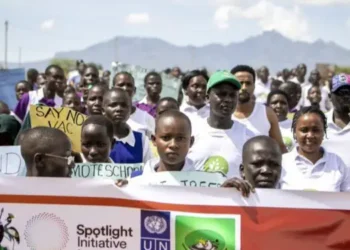Kapchorwa: Travelers from Mbale City to Kapchorwa District and the vice-versa are sweating on footing the fare and choking for breath inside taxis.
The appalling state of affairs exposes a cobweb of greed for money, lawlessness and passenger ignorance. In a detailed capture of a sorry journey by this writer, the conductor stands out as the master-of-the-game, “the chap with a fat wallet”.
But the big question of the day is, why do people from Sebei continue to endanger their lives, seated in excess while traveling on a good tarmac road? Are there no traffic officers on duty? Is the fare cheap? Are the vehicles few?, you will be shocked by these revelations.
I took a comfortable back seat at around 1:45pm, among the first clients in a commuter taxi from Mbale City to Kapchorwa District. It took the shrewd transporters another two-and-half hours to have the vehicle super congested. We set off from Mbale, 20 people onboard,including the driver and the hustler conductor. The passengers share pleasantries, but stare with discomfort. “Let’s hurry, I am going upto Bukwo District,” an elderly man in his 60s shouts at the driver. We steer the wheel, heading for Sironko, our first gateway district.
After a 25-minute drive, we are stopped by traffic offices. A jolly-brown looking lady and a policeman holding a gun. The conductor whispers to the passengers. “Haaa, these Sironko officers are tough, but we will handle it,” he says. Madam officer swings “Why have you carried excess passengers?” he asks the conductor who adamantly walks towards the back of the taxi. After rapping threatening words to the driver, madam officer orders the extra passengers seated on the edge of each row to get out. Two mature men exit the taxi.
The offers engage privately with the transporters, before giving a green light to our journey. They, however, warn the two passengers not to use the taxi. “Don’t use this taxi, we will trap you from in front,” the police lady says. The conductor shamelessly orders the two passengers to take a boda boda ride and “find us 200 metres ahead”. “I WILL PAY THE BODA BODA GUY,” he says as the traffic officers hear. Our colleagues join us after five minutes, joyfully. The conductor, having his prey all on board, chest-thumps“Those officers make good money, just imagine getting around Shs10,000 from all of our vehicles. They collect over Shs500,000 a day and declare something small for road offenses. We are all surviving,” he tells passengers who laugh sheepishly.
The next stop over is Bulambuli District. The conductor is relaxed and smiling. “THESE ONES ARE GOOD,” The driver speaks authoritatively. “Get this Shs5,000 and talk to them,” he tells the conductor in Lumasaba as he sends the cash. The driver parks the vehicle and walks behind the taxi to “greet” the officers. He returns happy. Once we leave Bulambuli, the journey to Kapchorwa is smooth. No more stopovers. The business scheme has been executed. But here is a simple matrix. The excess four passengers will each pay Shs10,000 like any other person onboard. That totals to Shs40,000. The conductor has possibly spent Shs20,000 or Shs30,000 on the corruption scheme. However, when they make the return journey, he says they spend less if they meet the same officers.
“We normally survive like this, but the return route is almost cost-free if we meet the same officers,” the conductor says after a talk in Kapchorwa town.
Our fellow Kinsmen, let’s unite against this vice. The rebellion should start with the passengers. We need to hold the taxi associations in Kapchorwa and Mbale accountable and mount intense pressure on the police force.
We can pick a lesson from this story, although we still have a long way to go, IGNORANCE SHOULD NEVER LEAD US TO THE GRAVE. LETS PREVENT ROAD ACCIDENTS TOGETHER. “EVERY LIFE MATTERS.”















